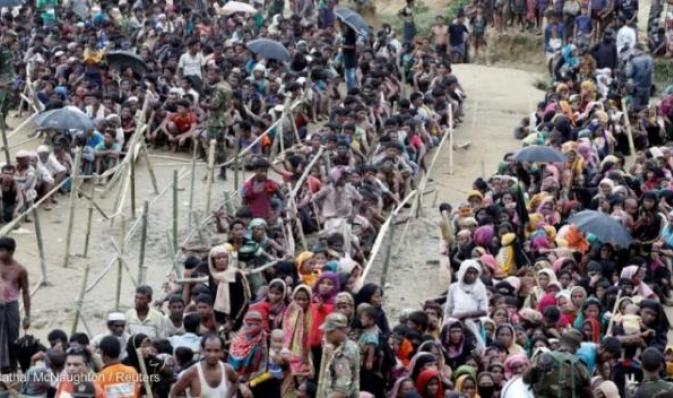
Maung Zarni, a Myanmar genocide scholar and human rights activist, said the determination came years too late and that he was disappointed it hadn’t been accompanied by significant action, such as sending Myanmar’s ambassador to the U.S. home.
“What matters is if the U.S. has the political will to follow through its rhetoric of accountability,” Zarni said, adding that he doesn’t want “the determination to be another piece of false hope.”
By Adva Saldinger | Published by DEVEX on March 28, 2022
Last week, the United States announced that it had determined that the Myanmar military committed a genocide against the Rohingya. It was a decision that came more than four years after more than 730,000 Rohingya from Myanmar were forced to flee and about three years since a State Department-commissioned investigation by the Public International Law and Policy Group concluded that “there were reasonable grounds to believe” a genocide had been committed.
The decision was welcomed by many Rohingya, Myanmar people, and human rights experts, but they say they now expect the U.S. to take action based on that decision.
“Determining genocide is not enough if no action is followed by it,” said Kyaw Win, executive director of the Burma Human Rights Network, based in London.
Maung Zarni, a Myanmar genocide scholar and human rights activist, said the determination came years too late and that he was disappointed it hadn’t been accompanied by significant action, such as sending Myanmar’s ambassador to the U.S. home.
“What matters is if the U.S. has the political will to follow through its rhetoric of accountability,” Zarni said, adding that he doesn’t want “the determination to be another piece of false hope.”
It’s unclear whether the U.S. would consider such an action, though it has been outspoken about its opposition to the military coup that occurred last year. While the U.S. is one of the largest donors to the Rohingya humanitarian crisis, has issued economic sanctions against military officials and has a geostrategic interest in the country, it’s unclear at this point how much farther it might go to support the opposition and pressure the military, despite the various requests from activists and experts.
The announcement
Last week, as U.S. Secretary of State Antony Blinken announced the determination, he said the U.S. would provide nearly $1 million to the U.N. Independent Investigative Mechanism for Myanmar to support its efforts to collect, preserve, and analyze evidence of “the most serious international crimes” in Myanmar.
He also said the U.S. has shared information with Gambia related to the case it filed against Myanmar under the Genocide Convention at the International Court of Justice. Further, the U.S. has imposed sanctions on 65 individuals and 26 entities tied to the military, had supported a U.N. General Assembly resolution to stop the flow of arms into Burma, and has contributed nearly $1.6 billion in humanitarian aid to the Rohingya since 2017.
On Friday, the U.S. Treasury Department also issued 10 additional sanctions against Burmese military leaders, their associates, and related businesses — effectively freezing their assets in the U.S.
The United Kingdom and Canada also put in place similar sanctions on Friday, according to a statement from Blinken, in which he said that the U.S. “will continue to impose costs on the military regime and those who support it until it ceases the violence and restores Burma’s path to democracy.”
But experts told Devex that now is the time to build on the determination to put further pressure on the Myanmar military and provide support to the National Unity Government.
Blinken’s determination had the Myanmar military “panicking” and making some structural changes and arrests of its own people, Win said.
“If the U.S. is not doing anything, they will see that as a symbolic action, not meaningful,” Win said. There must be consequences for the military and “the 600,000 Rohingya remaining in Myanmar must be protected,” he said.
“The U.S. declared that the leadership of the state of [Myanmar] is a bunch of international criminals. Once you say you are all criminals the next step is to get them arrested or out of your backyard,” Zarni said.
But he and some others are skeptical that the U.S. will take decisive action, especially with so much attention focused on Russia’s invasion of Ukraine. Win said that action in Myanmar should be a key part of the U.S. strategy to counter Russia, which has been a major arms supplier to the Myanmar military. If Myanmar fails in its democratic struggle, it will “injure the whole region” and diminish U.S. influence, Win said.









